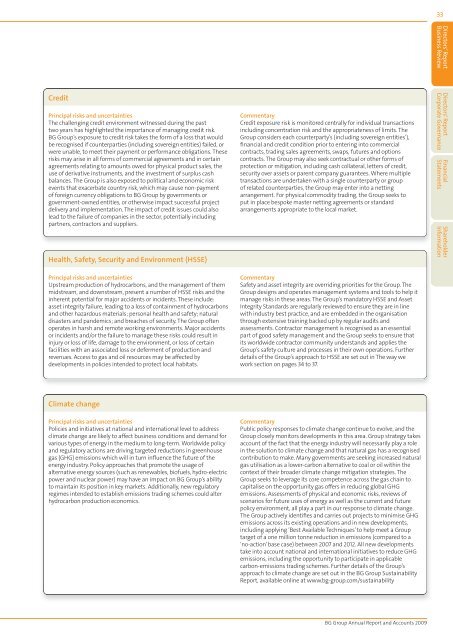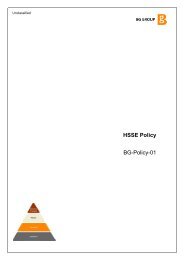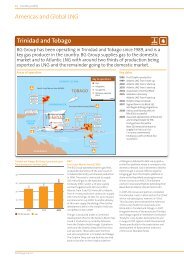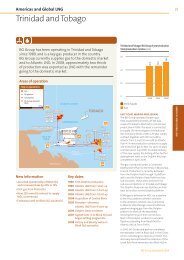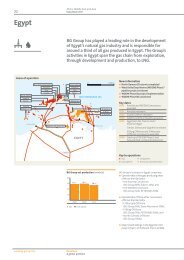Annual Report and Accounts 2009 - BG Group
Annual Report and Accounts 2009 - BG Group
Annual Report and Accounts 2009 - BG Group
You also want an ePaper? Increase the reach of your titles
YUMPU automatically turns print PDFs into web optimized ePapers that Google loves.
Credit<br />
Principal risks <strong>and</strong> uncertainties<br />
The challenging credit environment witnessed during the past<br />
two years has highlighted the importance of managing credit risk.<br />
<strong>BG</strong> <strong>Group</strong>’s exposure to credit risk takes the form of a loss that would<br />
be recognised if counterparties (including sovereign entities) failed, or<br />
were unable, to meet their payment or performance obligations. These<br />
risks may arise in all forms of commercial agreements <strong>and</strong> in certain<br />
agreements relating to amounts owed for physical product sales, the<br />
use of derivative instruments, <strong>and</strong> the investment of surplus cash<br />
balances. The <strong>Group</strong> is also exposed to political <strong>and</strong> economic risk<br />
events that exacerbate country risk, which may cause non-payment<br />
of foreign currency obligations to <strong>BG</strong> <strong>Group</strong> by governments or<br />
government-owned entities, or otherwise impact successful project<br />
delivery <strong>and</strong> implementation. The impact of credit issues could also<br />
lead to the failure of companies in the sector, potentially including<br />
partners, contractors <strong>and</strong> suppliers.<br />
Health, Safety, Security <strong>and</strong> Environment (HSSE)<br />
Principal risks <strong>and</strong> uncertainties<br />
Upstream production of hydrocarbons, <strong>and</strong> the management of them<br />
midstream, <strong>and</strong> downstream, present a number of HSSE risks <strong>and</strong> the<br />
inherent potential for major accidents or incidents. These include:<br />
asset integrity failure, leading to a loss of containment of hydrocarbons<br />
<strong>and</strong> other hazardous materials; personal health <strong>and</strong> safety; natural<br />
disasters <strong>and</strong> p<strong>and</strong>emics; <strong>and</strong> breaches of security. The <strong>Group</strong> often<br />
operates in harsh <strong>and</strong> remote working environments. Major accidents<br />
or incidents <strong>and</strong>/or the failure to manage these risks could result in<br />
injury or loss of life, damage to the environment, or loss of certain<br />
facilities with an associated loss or deferment of production <strong>and</strong><br />
revenues. Access to gas <strong>and</strong> oil resources may be affected by<br />
developments in policies intended to protect local habitats.<br />
Climate change<br />
Principal risks <strong>and</strong> uncertainties<br />
Policies <strong>and</strong> initiatives at national <strong>and</strong> international level to address<br />
climate change are likely to affect business conditions <strong>and</strong> dem<strong>and</strong> for<br />
various types of energy in the medium to long-term. Worldwide policy<br />
<strong>and</strong> regulatory actions are driving targeted reductions in greenhouse<br />
gas (GHG) emissions which will in turn influence the future of the<br />
energy industry. Policy approaches that promote the usage of<br />
alternative energy sources (such as renewables, biofuels, hydro-electric<br />
power <strong>and</strong> nuclear power) may have an impact on <strong>BG</strong> <strong>Group</strong>’s ability<br />
to maintain its position in key markets. Additionally, new regulatory<br />
regimes intended to establish emissions trading schemes could alter<br />
hydrocarbon production economics.<br />
Commentary<br />
Credit exposure risk is monitored centrally for individual transactions<br />
including concentration risk <strong>and</strong> the appropriateness of limits. The<br />
<strong>Group</strong> considers each counterparty’s (including sovereign entities’),<br />
financial <strong>and</strong> credit condition prior to entering into commercial<br />
contracts, trading sales agreements, swaps, futures <strong>and</strong> options<br />
contracts. The <strong>Group</strong> may also seek contractual or other forms of<br />
protection or mitigation, including cash collateral, letters of credit,<br />
security over assets or parent company guarantees. Where multiple<br />
transactions are undertaken with a single counterparty or group<br />
of related counterparties, the <strong>Group</strong> may enter into a netting<br />
arrangement. For physical commodity trading, the <strong>Group</strong> seeks to<br />
put in place bespoke master netting agreements or st<strong>and</strong>ard<br />
arrangements appropriate to the local market.<br />
Commentary<br />
Safety <strong>and</strong> asset integrity are overriding priorities for the <strong>Group</strong>. The<br />
<strong>Group</strong> designs <strong>and</strong> operates management systems <strong>and</strong> tools to help it<br />
manage risks in these areas. The <strong>Group</strong>’s m<strong>and</strong>atory HSSE <strong>and</strong> Asset<br />
Integrity St<strong>and</strong>ards are regularly reviewed to ensure they are in line<br />
with industry best practice, <strong>and</strong> are embedded in the organisation<br />
through extensive training backed up by regular audits <strong>and</strong><br />
assessments. Contractor management is recognised as an essential<br />
part of good safety management <strong>and</strong> the <strong>Group</strong> seeks to ensure that<br />
its worldwide contractor community underst<strong>and</strong>s <strong>and</strong> applies the<br />
<strong>Group</strong>’s safety culture <strong>and</strong> processes in their own operations. Further<br />
details of the <strong>Group</strong>’s approach to HSSE are set out in The way we<br />
work section on pages 34 to 37.<br />
Commentary<br />
Public policy responses to climate change continue to evolve, <strong>and</strong> the<br />
<strong>Group</strong> closely monitors developments in this area. <strong>Group</strong> strategy takes<br />
account of the fact that the energy industry will necessarily play a role<br />
in the solution to climate change <strong>and</strong> that natural gas has a recognised<br />
contribution to make. Many governments are seeking increased natural<br />
gas utilisation as a lower-carbon alternative to coal or oil within the<br />
context of their broader climate change mitigation strategies. The<br />
<strong>Group</strong> seeks to leverage its core competence across the gas chain to<br />
capitalise on the opportunity gas offers in reducing global GHG<br />
emissions. Assessments of physical <strong>and</strong> economic risks, reviews of<br />
scenarios for future uses of energy as well as the current <strong>and</strong> future<br />
policy environment, all play a part in our response to climate change.<br />
The <strong>Group</strong> actively identifies <strong>and</strong> carries out projects to minimise GHG<br />
emissions across its existing operations <strong>and</strong> in new developments,<br />
including applying ‘Best Available Techniques’ to help meet a <strong>Group</strong><br />
target of a one million tonne reduction in emissions (compared to a<br />
‘no-action’ base case) between 2007 <strong>and</strong> 2012. All new developments<br />
take into account national <strong>and</strong> international initiatives to reduce GHG<br />
emissions, including the opportunity to participate in applicable<br />
carbon-emissions trading schemes. Further details of the <strong>Group</strong>’s<br />
approach to climate change are set out in the <strong>BG</strong> <strong>Group</strong> Sustainability<br />
<strong>Report</strong>, available online at www.bg-group.com/sustainability<br />
<strong>BG</strong> <strong>Group</strong> <strong>Annual</strong> <strong>Report</strong> <strong>and</strong> <strong>Accounts</strong> <strong>2009</strong><br />
33<br />
Directors’ <strong>Report</strong><br />
Business Review<br />
Directors’ <strong>Report</strong><br />
Corporate Governance<br />
Financial<br />
Statements<br />
Shareholder<br />
Information


